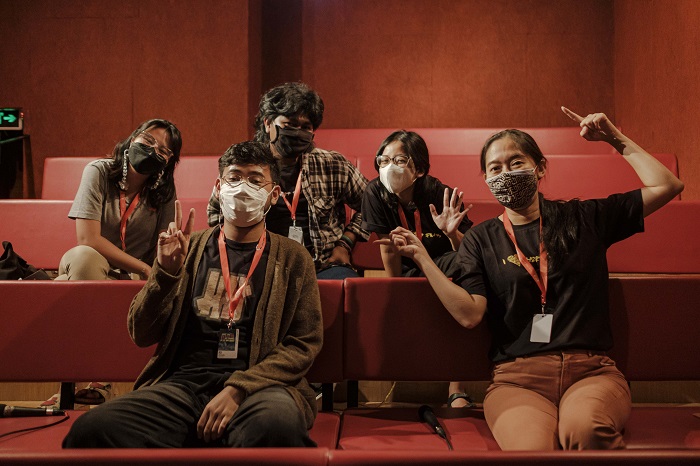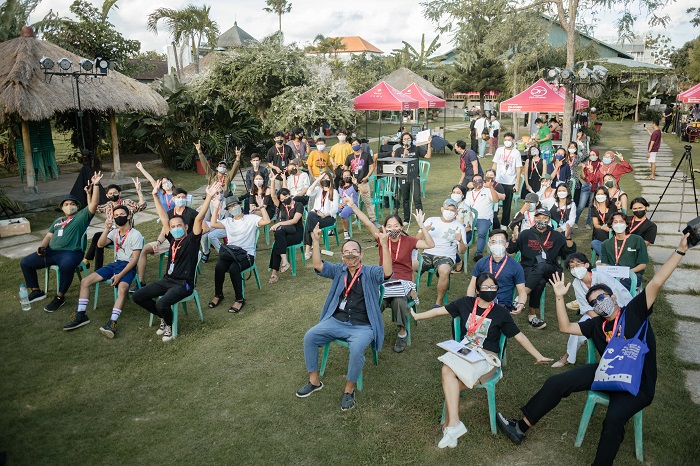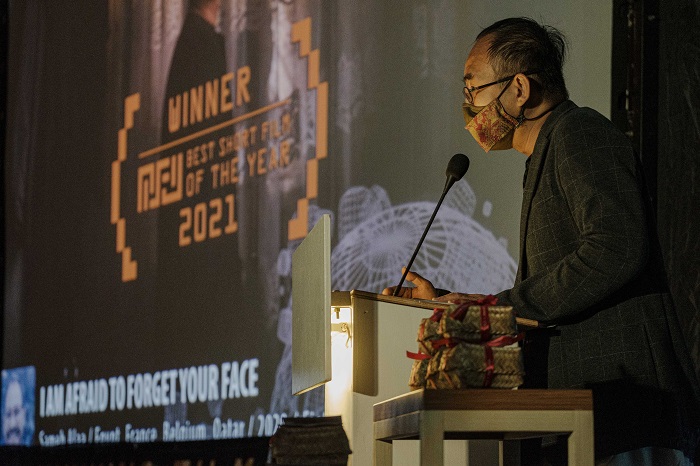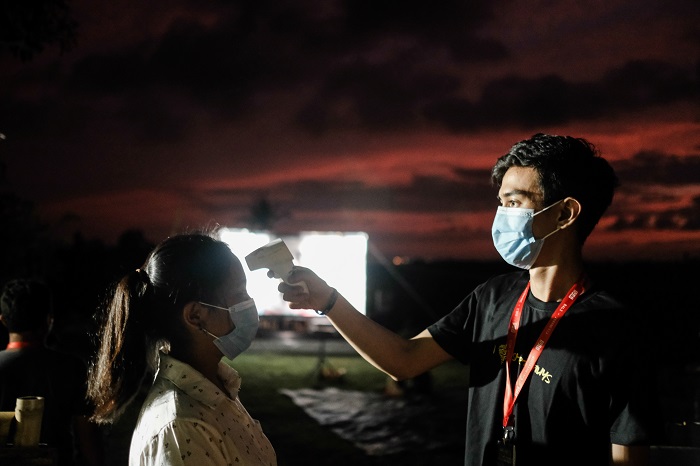Fransiska Prihadi
When watched together on the big screen, a well-curated short film program has the potential to produce emotional and physical responses in the audience. Each audience will have its own personal after-screening experience, which is then validated by the act of discussion.
The willingness to listen to others’ opinions while trying to articulate an emotion, is a good exercise to achieve a critical mindset. Even small talk outside the festival screening venue is precious. At in-person film festivals, the filmmakers have the opportunity to meet their audience and a stronger impression can create connections and even collaborations. It is one more step towards building a willingness to understand different perspectives.
Since 2002, from its base in Denpasar, Minikino has been dedicated to showcasing short films and providing a space for film lovers, critics and filmmakers to come together to share their work and ideas. The volunteer-based organisation hosts various activities throughout the year, and since 2015 its largest event has been the annual Minikino Film Week Bali International Short Film Festival.
Connecting through film
From 2015 to 2019, Minikino Film Week has presented a program of world-quality short films screened at micro and pop-up cinemas across the island, to audiences of industry professionals, festival guests and short film fans – local, national and international. Minikino respects and considers film culture as a culture of collaboration and integration of diversities; and short films are where film culture originates and is seeded.

The festival has built a network of screening partners across Bali and facilitates intercultural meetings, inviting participants to explore remote areas of Bali through its screenings. In a relatively short time, Minikino has formed partnerships with other festivals and organisations in the region and across the world, enhancing not only Minikino’s reputation as a festival body, but also that of Indonesia’s film industry more broadly.
Like many festivals around the world, in 2020, Minikino was faced with the challenge of reimagining the vision of its annual international short film festival.
Minikino’s leadership resolved to find a way to run an in-person festival in 2020 and 2021. Our commitment to inspiring people, including the volunteers, filmmakers and the audience, motivated us to continue to find a way to bring people together and manage their fears of the pandemic.
Working on Minikino Film Week in the midst of a pandemic was a vastly different experience for our mostly young volunteers, than in previous years. In 2021, most of our volunteers were in their second year of studying online, and none had campus or any live event experience. In the absence of these interactions and experiences at school or university, the festival offered communications, organisational and leadership training.
Lessons in careful management
The risk of holding an international short film festival in Bali in the midst of a pandemic would be described by risk management professionals, perhaps, as falling into the quadrant of known-unknowns. As organisers, we understood that there were things that we could not predict.
Nobody knew exactly when the government would issue a Community Activities Restrictions Enforcement (Pemberlakuan Pembatasan Kegiatan Masyarakat, PPKM), which can apply at various levels of restriction. As a self-funded festival, support largely comes from private donations of cash or in-kind support. A funding proposal for support from the government was approved only two weeks before the festival was due to commence. During the festival, a pop-up cinema in Pedawa Village, Buleleng had to be cancelled due to sudden COVID-19 cases in the area.

During 2020-2021, as with so many other film festivals all around the world, Minikino has had to be prepared for alternate plans. Through its existing network of connections with festivals around the world we remained connected and learnt from the practices being adopted by others.
In 2020, Minikino joined the Short Film Conference Working Group for online film festivals Code of Ethics. As the only member in Southeast Asia, Minikino represented the region at a global short film conference based in Clermont-Ferrand, France. A strong network with smooth communication due to a sense of solidarity between international short film festivals allows for the sharing of knowledge, and enables us to learn from each other’s experiences as to what sort of adaptation works, and what does not.
During this period, Minikino collaborated with the Documentary Dream Centre and Yamagata International Documentary Film Festival to hold their third edition of Yamagata Documentary Dojo. The 30-day residency program for Asian filmmakers was originally due to be held in a hot spring spa resort in the mountains of Yamagata, Japan. After almost eight months planning, Yamagata Documentary Dojo 3 was finally held online in 2021. Participants in the four-day online workshop were based in Hijiori Onsen, Ohkura Village, Yamagata Prefecture, Japan; Denpasar, Bali, Indonesia and Chiangmai, Thailand. The process of co-organising the Yamagata Documentary Dojo 3, led us to develop our own six-month hybrid internship program in 2021.
Normalising a hybrid festival
For Minikino Film Week 6 held in September 2020, vaccinations for the coronavirus were not yet available and Indonesia’s international borders remained closed. The festival went ahead under a series of strict conditions. Screenings and activities were limited to pass holders and organisers issued daily reminders to audiences to complete a self-health check for COVID-19- symptoms before attending the screening venues.

For Minikino Film Week 7 in 2021, in the wake of the second wave of the global pandemic, the organisers applied even stricter access protocols. It was mandatory for Festival Passholders to provide proof that they had had at least their first dose of a COVID-19 vaccination or a recent negative test. In 2021, the festival was once again held amidst PPKM level 4 restrictions, under which business activities can only operate at a maximum of 50 percent capacity. Operating hours were limited until 8pm local time.
Minikino Film Week’s sixth and seventh editions presented programs which remained the same as previous years and involved more than 10 venues around the island of Bali. All short films program screenings are held as in-person screenings. The Opening Ceremony and International Awarding and Closing event were a hybrid event, mixture of online and in-person attendance.
Over the past two years of the pandemic, Edo Wulia, the festival director, together with the committee were determined to find a way to keep the festival going. Minikino organisers were aware that holding a film festival in the midst of the pandemic was definitely challenging and involved the risk of having to make sudden adjustments. As Edo remarked at the time, ‘We understand that it won’t be easy, but it is doable’. The benefits for our community of filmmakers, audience members and volunteers, in bringing us together and staying connected during a period of such isolation and worry, made all the efforts put in place to protect each other whilst celebrating film together, worthwhile.
Fransiska Prihadi (cika@minikino.org) is an architect, co-founder of the art-house cinema MASH Denpasar and Programme Director of Minikino, Bali. She served as guest programmer & jurist for various national and international short film festivals, with experience as facilitator and mentor for filmmaking and film critic workshops.
